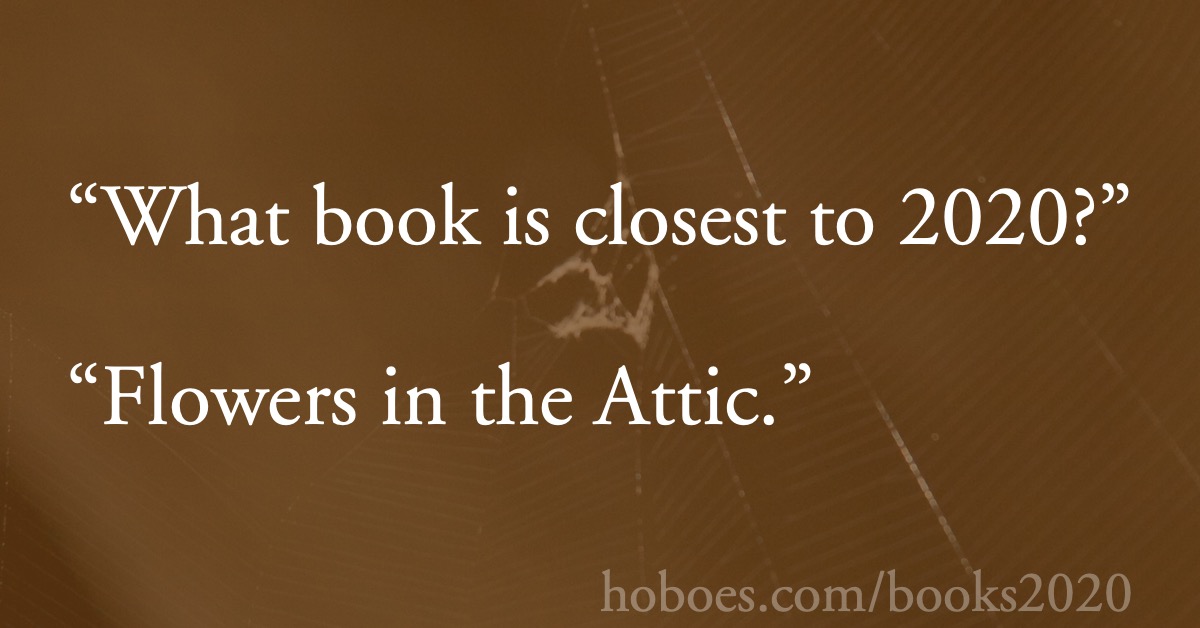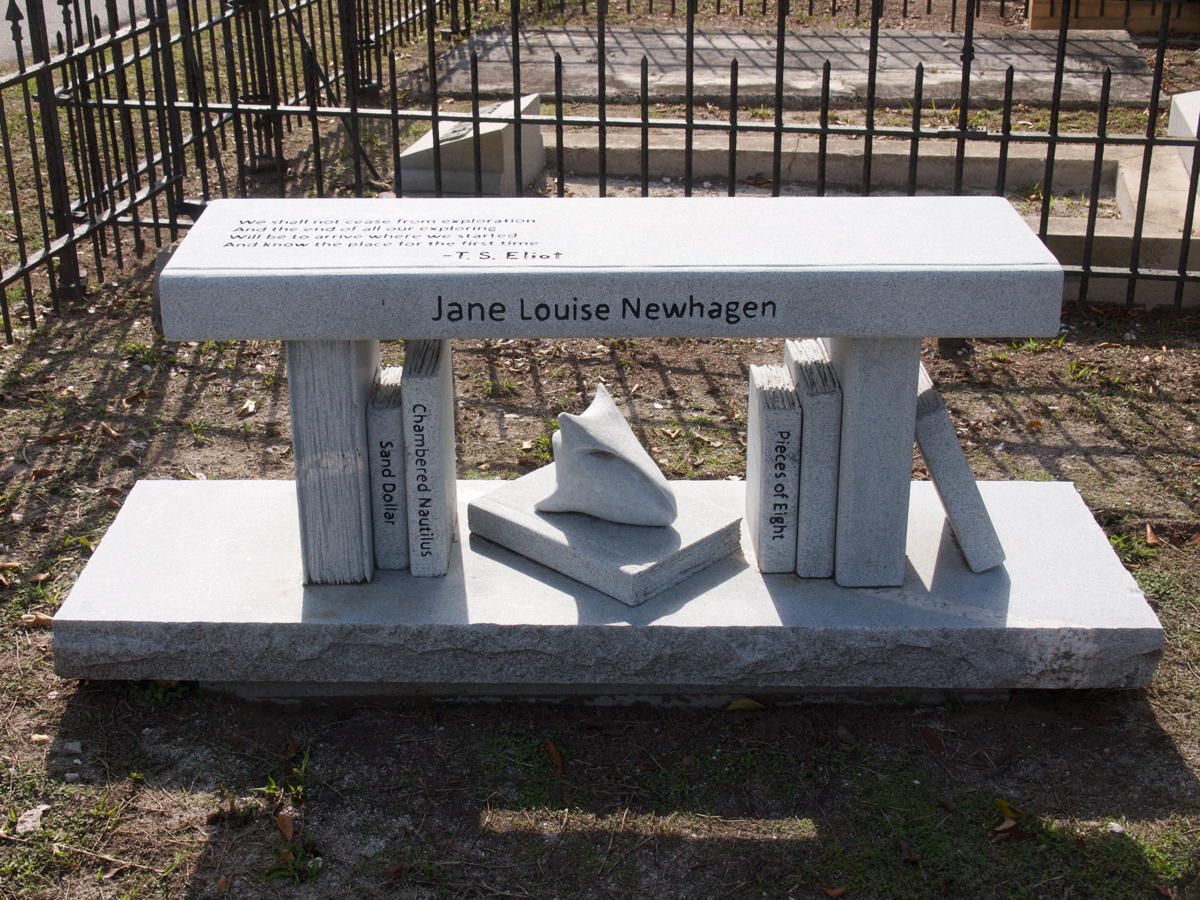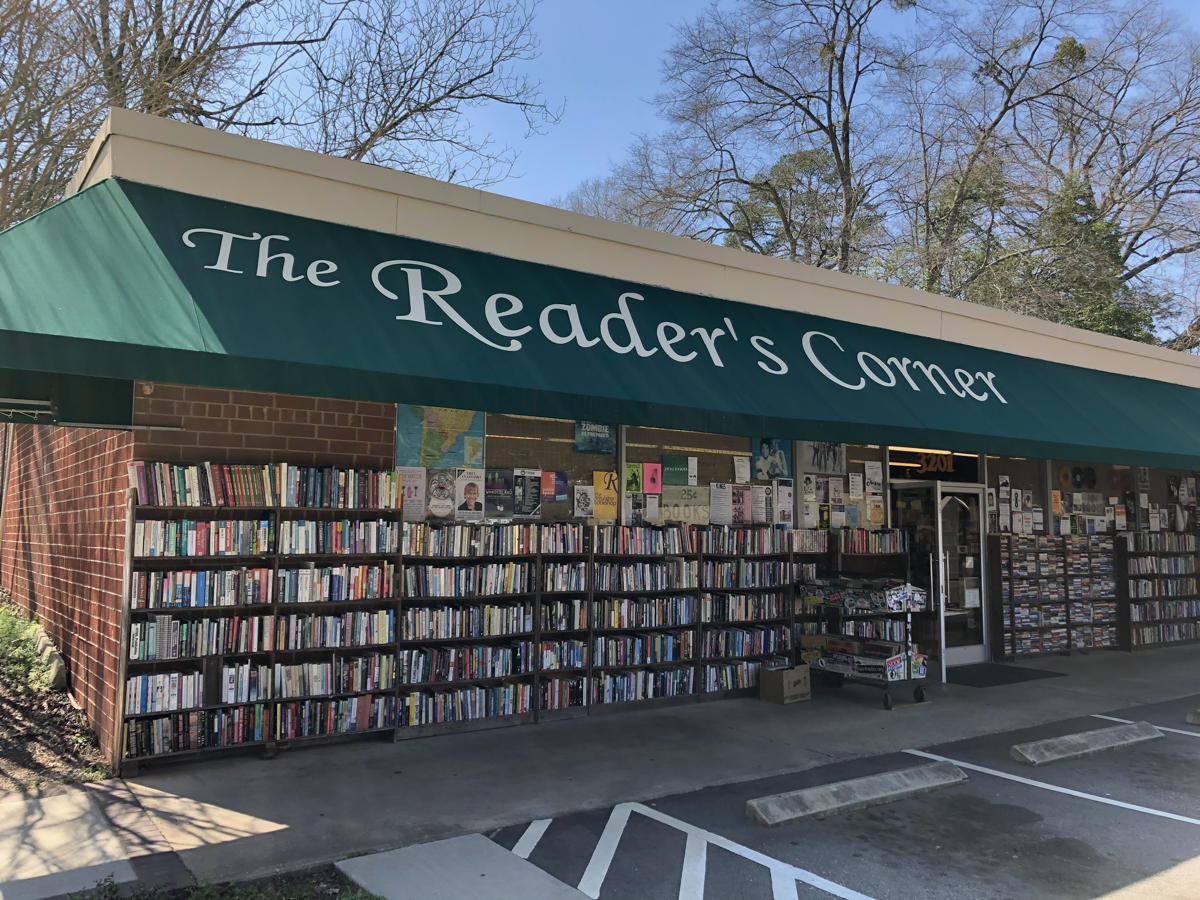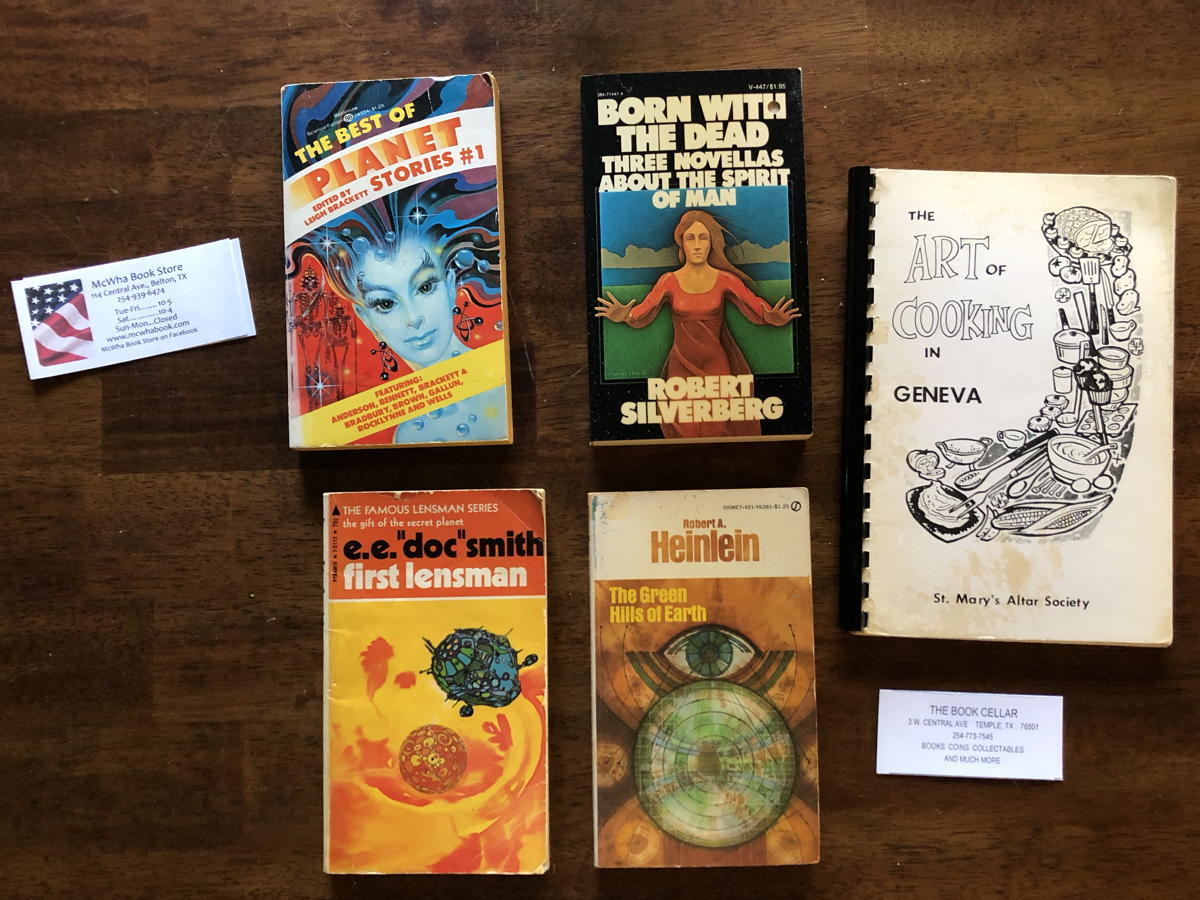The Year in Books: 2020
Despite the opening quote1, the year started out deceptively wonderful on the book front. I went to Miami with a friend in February. I didn’t buy any books, but I did get out to Key West and saw Hemingway’s library and typewriter. And I admired the cemetery marker for local Key West author Jane Louise Newhagen.
Then, in March, I went to Raleigh. I didn’t know at the time, but the only new bookstores I would visit in 2020 would be those bookstores in Raleigh at the beginning of the year, and a junk store in Michigan toward the end of the year.
Happily, both were fruitful.
In Raleigh I picked up the second of Chaim Potok’s Asher Lev books. And finally fulfilled a programming urge that’s been on the back of my mind for over a decade: I picked up Exploring Expect and ran through the tutorial on the Expect scripting language. I also found a really nice Richard Feynman• book I hadn’t known existed, the book version of his famous Cornell lectures—which I also hadn’t known existed. After reading the book, I watched the movie.
I also found a couple of DC Heroes adventures, one of which I ran to great fun at the North Texas RPG Convention.
Then, on Friday, March 13, while I was in the air returning home, the whole country started to shutdown. That was it for all the great book sales for the rest of the year.
In August as Texas began to open up I decided to get out of the house and go on my I-35 book drive again. I visited the Book Cellar in Temple, Brazos Books and Golden’s Book Exchange in Waco, and McWha Bookstore in Belton. I’ve been to all of these bookstores before, and always enjoy the visit.
I managed to acquire 51 books this year, if you include The Life of Stephen A. Douglas that I downloaded from the Internet Archive. That 51 books, however, also includes a handful of manuals for retro computers that are two to six pages long. So there really wasn’t a lot of book buying this year.
Much of what I did buy this year as my to-read-soon shelf emptied came from AbeBooks and eBay. I finally finished Sarah Hoyt’s Shakespeare fantasy trilogy that way; Any Man So Daring was an amazing end to a really nice trilogy. It’s full of fun, pure magic, and adventure.
I started the year reading the Food & Wine Annual Cookbook for 2006 and for 2008. I’d picked them both up at the 2019 New Braunfels library sale—a sale that was sadly canceled in 2020.
Pan-roasted salmon, spicy red pepper and walnut dip, spicy cashew crunch, granola with maple-glazed walnuts, hot, buttered cauliflower puree, and spinach and egg-drop pasta soup. All great recipes that have served me well through the rest of the year. But I’ll have more about great food in 2020 later.
I ended the year reading a book I last read in the late seventies or early eighties: The Classic Science Fiction Library’s Best of Murray Leinster. It could very well be the first science fiction book I read. I don’t know what happened to my first copy. I only had a few of those best ofs, because I had no bookstore in the small town where I grew up and supermarkets didn’t keep back stock.2 But I managed to complete my collection of them in 2017 when I finally found The Best of Philip K. Dick at LibertyCon.3 The library is a great sampling of great science fiction. I still have some of these in my to-read pile to look forward to in 2021.
The longest book I read this year, according to Goodreads, was The Unabridged Jack London. I was introduced to Jack London through Mark Steyn’s readings of some of London’s short stories. This tome collects a handful of London’s novels and a whole bunch of his novellas and short stories. That’s another book I’d picked up in 2019 at New Braunfels. Well recommended.
The most popular book I’ve read was H.G. Wells’s The Time Machine. I read the Project Gutenberg version as an eBook, after watching the very strangely-updated George Pal Time Machine from 1960. The book, as it so often is, was better than the movie. If you are one of the apparently few who haven’t read The Time Machine, I recommend it; it’s not just one of the most influential science fiction books ever written, it’s a great book.
What were the best books I read in 2020?
I can’t rave enough about Sarah Hoyt’s Any Man So Daring. The series was very good, and very refreshing fantasy. But this ending to the trilogy was just so fantastic in the pure fantasy sense, building on everything that had been done before. If you’re a fantasy fan, a Shakespeare fan, and like secret histories, I recommend this series.
I found A. Merritt’s The Metal Monster to be in a similar vein, but toward science fiction instead of fantasy. The world Merritt created and had his heroes explore was just so incredibly fantastic and yet still had the kind of intelligent predictions of future cultural development that makes science fiction timeless. Never was I sure where the story was going; it always surprised me in a way that made sense.
I felt myself as fragile as a doll of glass in the hands of careless children.
I already mentioned The Time Machine. It’s popular for a reason. Like The Metal Monster it isn’t just a great read, it’s great futurism.
The Chaim Potok book I picked up in Raleigh was The Gift of Asher Lev. It’s both very different and very similar to the first book in the pair, My Name is Asher Lev. He’s now a successful painter going through a mid-life crisis. Potok combines several alien world—the Jewish immigrant experience; the Orthodox Jewish experience in New York City; the artist in exile, the child prodigy in adulthood—into a fascinating story.
My papa once told me that a long way that is sure is better than a short way that is not.
On the non-fiction front, I finally read Alvin Toffler’s Future Shock. I’ve read all of its sequels while I was writing the long-out-of-date What Your Children are Doing on the Information Highway, but not Future Shock itself. It was amazing not just for how well Toffler predicted future social changes, but also for how poorly he advised us to handle those changes. He literally wanted a government bureaucracy tasked with holding back progress. The car, the transistor, clean clothes, these all came too quickly, we should have been denied these advancements or at least spaced them out further. He doesn’t address the lives saved by these technological advancements. He would have put the personal computer, home movie watching, portable phones, email, and video chats up for approval by the same people who thought that the Segway was the acme of the modern urban vehicle.
On the history front, I read both Thomas Sowell’s• Black Rednecks and White Liberals and Victor Davis Hanson’s The Second World Wars. Both of these books are practically civic necessities.
Sowell argues that history is “a gold mine of experience” that can be used to check “contemporary plans, theories, beliefs, and hopes… against the record of what has happened in the past when similar notions were put into practice.”
Much of his book explains, through history, why all ghettoes but one eventually faded. Importantly, he outlines how most communities overcame ghettoization as a guide to how our current ghettoes can also be overcome.
Hanson’s The Second World Wars is an overview of how World War II was fought and how it was won by the allies. He manages to turn logistics into an epic story, and highlights the massive changes in technology between the beginning and the end of the war. World War II affected almost every country in Europe, Asia, the Middle East, and Africa. It changed the geopolitics of the world completely, and is filled with timeless lessons. Like science fiction, great histories help us understand the future.
I also read two phenomenal science and math books in 2020. Richard Feynman’s• The Character of Physical Law, his Cornell lecture series I mentioned earlier, is as much about how science works as it is about physics in particular, which almost makes it a civic necessity as well.
Nature uses only the longest threads to weave her patterns, so each small piece of her fabric reveals the organization of the entire tapestry.
David G. Wells’s Penguin Dictionary of Curious and Interesting Numbers reveals some of those threads in mathematics. This is a bathroom reader for fans of the movie π. Sadly, it predates the popularity of the Hitchhiker’s Guide to the Galaxy, so the meaning of life is not among the highlights of the entry for 42.
I have a lot more sympathy with people who believe God has left secret messages in strange numbers after reading this book. It’s an amazing book for browsing through, and there is a lot of mathematical history hidden among its entries.
It’s a strange book, but 2020 was a strange year, deserving of strange books.
In response to The Case for Books in 2015: In 2015, I read a lot of books… and bought a lot more. That’s not a sustainable market plan.
The quote comes from Big Fat Meanie on the Ace of Spades HQ.
↑I had the same problem with getting uninterrupted runs of comic books.
↑I’m not including The Best of John Brunner, which, while I do own it, I’m still not sure is part of the collection.
↑
book reviews
- Goodreads: Year in Books 2020 at Jerry@Goodreads
- I read 28,260 pages over 120 books this year, according to Goodreads. That’s down from 2019, but they were some great books.
- Review: Any Man So Daring: Jerry Stratton at Jerry@Goodreads
- “This is an incredible conclusion to Hoyt’s Shakespeare trilogy, utterly fantastic. From the location—an island of pure magic, the crux of Elfland—to the characterization of the two major characters, a middle-aged writer worried about the tradeoffs between artistic freedom, providing for his family, and being with his family; and a teenager raised in isolation and learning the hard way how to interact with and interpret other people’s actions and words.”
- Review: Black Rednecks & White Liberals: Jerry Stratton at Jerry@Goodreads
- “This is a very focused history book. It touches on several aspects of the slave trade, but is focused specifically on how it affected black Americans and race relations in the United States. Sowell’s thesis is that black culture today and black language today is the culture and language of antebellum southern rednecks, inherited from pre-English ‘Scottish highlands, Ireland, Wales, or the northern and western uplands of England.’”
- Review: Exploring Expect: A Tcl-based Toolkit for Automating Interactive Programs: Jerry Stratton at Jerry@Goodreads
- “I ran into Expect as the solution to a problem many years ago, probably in the mid-2000s, and I thought at the time that it seemed like a good idea to learn it more. But I put it on the back burner until I happened to see this book in a used bookstore’s discount rack in Raleigh, North Carolina. I think it remains worth knowing, and is likely to be a useful part of a serious scripting toolbox.”
- Review: Future Shock: Jerry Stratton at Jerry@Goodreads
- “This is an amazing book; amazing both because of how clearly he showed the failure of bureaucracy as technological and social advancement speeds up, and amazing because of how he cannot see beyond more bureaucracy as the solution.”
- Review: The Character of Physical Law: Jerry Stratton at Jerry@Goodreads
- “This is a semi-transcript of a lecture series that Feynman gave at Cornell University. The lectures are about the character of physical law, that is, what kinds of things show up in the laws of physics, their symmetries and conservations.”
- Review: The Gift of Asher Lev: Jerry Stratton at Jerry@Goodreads
- “Asher Lev is now a highly successful painter living in France. He has two children, a very structured life, and partly because he lives a safe distance from his father. That all changes when his uncle Yitzchok, who was instrumental in Asher becoming a painter, dies, and Asher returns to Brooklyn with his family.”
- Review: The Life of Stephen A. Douglas: Jerry Stratton at Jerry@Goodreads
- “I’ve been reading a lot about President Lincoln lately, and throughout Stephen A. Douglas appears as a sort of master villain. It seemed like a good idea to read about Douglas from the perspective of someone who considered him a great man and a hero. Sheahan wrote this book on the eve of the 1860 election season, ending with the assumption that Douglas would be the next president.”
- Review: The Metal Monster: Jerry Stratton at Jerry@Goodreads
- “This is a phenomenally strange story by an author known for the phenomenally strange. I had put off reading this because I expected the ‘metal monster’ of the title to be some standard robotic nemesis. It is everything but standard.”
- Review: The Penguin Dictionary of Curious and Interesting Numbers: Jerry Stratton at Jerry@Goodreads
- “I hadn’t planned on reading this book all the way through. I brought it downstairs thinking it might be a useful book for browsing randomly next to the armchair. But it’s so interesting I’m already fifty pages in. This is a bathroom reader for fans of the movie π. Each entry is a short description of what makes that number interesting.”
- Review: The Second World Wars: How the First Global Conflict Was Fought and Won: Jerry Stratton at Jerry@Goodreads
- “This is an incredible overview of World War II. Hanson, as a classical and a military scholar, is uniquely situated to put the war in context not just with then-current events, but with the lessons of previous wars in the same territories. His first chapter puts war in context with lessons learned since classical antiquity, and he continues to draw lessons from history near and far throughout the text.”
- Review: The Time Machine: Jerry Stratton at Jerry@Goodreads
- “Eight hundred thousand years ago, our ancestors roamed the earth as homo erectus or some intermediate species between erectus and sapiens. Eight hundred thousand years from now, H.G. Wells’s time traveler discovers a new human species in an idyllic and horrifying future.”
bookstores
- Friends of the New Braunfels Public Library Annual Book Sale
- The annual New Braunfels Library sale is well worth a visit if you live nearby.
- An I-35 book drive
- If you’re looking for a day trip to get you out of the house now that spring is here, why not drive up (or down) I-35 and visit some small bookstores between Round Rock and Waco?
great books
- Black Rednecks and White Liberals•: Thomas Sowell (paperback)
- “This explosive new book challenges many of the long-prevailing assumptions about blacks, about Jews, about Germans, about slavery, and about education. Plainly written, powerfully reasoned, and backed with a startling array of documented facts, Black Rednecks and White Liberals takes on not only the trendy intellectuals of our times but also such historic interpreters of American life as Alexis de Tocqueville and Frederick Law Olmsted.”
- The Character of Physical Law•: Richard Feynman (hardcover)
-
 A series of easy to follow and long to digest talks given at Cornell University.
A series of easy to follow and long to digest talks given at Cornell University.
- The Character of Physical Law: Probability and Uncertainty
- Richard Feynman Messenger Lectures at Cornell The Character of Physical Law Part 6 Probability and Uncertainty
miscellaneous
- 2020 in Food
- Unsurprisingly, 2020 was a good year for food.
- Review: The Best in Cooking in Westfield: Jerry Stratton
- “The title appeared to be ‘The Art of Cooking in Geneva’. But then, inside, it had three more covers: ‘Out of Springfield Kitchens’, ‘Home Cooking Secrets of Evanston’, and ‘The Best in Cooking in Westfield’.”
- Tuesday Overnight Open Thread (12/22/20) Quoteaplaooza Edition: Misanthropic Humanitarian at Ace of Spades HQ
- “This ornament didn’t hang itself.”
- What Your Children are Doing on the Information Highway
- There’s something happening here, and you don’t know what it is, do you, Mr. Jones?
More 2020
- 2020 in Food
- Unsurprisingly, 2020 was a good year for food.
More annual retrospectives
- My year in food: 2022
- From New Year to Christmas, from ice cream to casseroles, from San Diego to New Orleans, from 1893 to 2014… and beyond!
- My Year in Books: 2022
- From Hoplites to Venice… California, this has been a year in books filled with war, evil, and the dehumanization of man. But it’s also been a year of high adventure, magic, and larger-than-life heroes.
- My Year in Food: 2021
- From Washington DC to San Diego and one or two places in between, it’s been a very good year for food.
- My Year in Books: 2021
- From Louis l’Amour to slavery to H. Rider Haggard, it’s been a very good year in books.
- The Year in Books: 2019
- 2019 was a great year for reading old books.
- One more page with the topic annual retrospectives, and other related pages
More books
- My Year in Books: 2024
- This has been a wonderful year in books, especially for revisiting old classics and visiting some old classics for the first time.
- My Year in Books: 2023
- It’s been a slower year in books than previous ones, but it was still a year of fantasy in the past, in the future, and across time, as well as an unplanned foray into people doing the impossible and changing the world.
- My Year in Books: 2022
- From Hoplites to Venice… California, this has been a year in books filled with war, evil, and the dehumanization of man. But it’s also been a year of high adventure, magic, and larger-than-life heroes.
- My Year in Books: 2021
- From Louis l’Amour to slavery to H. Rider Haggard, it’s been a very good year in books.
- The Year in Books: 2019
- 2019 was a great year for reading old books.
- Two more pages with the topic books, and other related pages





